Crapshoot: Time Gate, the other game about templars and assassins

From 2010 to 2014 Richard Cobbett wrote Crapshoot, a column about rolling the dice to bring random obscure games back into the light. This edition was written the same week the third part of the Assassin's Creed series was announced to much excitement.
OK, see if any of this sounds familiar. It's the present day, and American-born William Tibbs has just discovered that he's the descendant of a noble Templar knight—a fact he learns when an assassin breaks into his room and tries to kill him with an axe. While he survives, mostly by dumb luck, he's soon captured by his enemies and forced to relive the life of his ancestor circa 1329. His mission? To track down a set of magic weapons forged by the precursors of mankind. His family symbol? A falcon.
Oh, and the cherry on top? There were three Time Gate games planned, though only one was ever released, and the start of this adventure shows when they'd have been set. The first? Templars. The second? Mumble mumble not relevant. But the third? The American War of Independence. Ubisoft, consider thyselves well and truly busted!
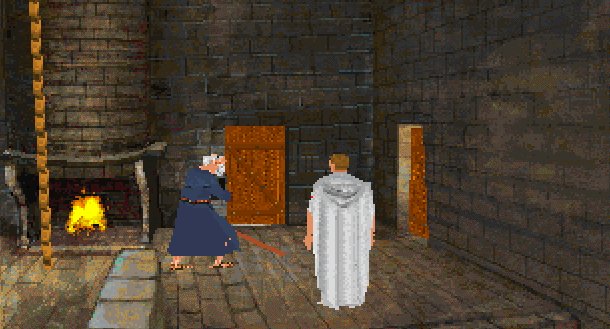
OK, OK, so I'm simplifying things—a little. Unlike Assassin's Creed, William actually does go back in time for his adventures, and everything is based on magic rather than science. The Templars aren't an evil worldwide conspiracy. The transportation is handled by a magical portal hidden in the well of a museum. The focus of the series would have been William's assorted incarnations fighting an eternal battle with an enemy called Wolfram, much like there's always a Blackadder and there's always a Baldrick. And there's no parkour. The exact opposite, really. But we'll get to that.
Who's William Tibbs? An American law student in Paris caught up in the secret of the Templars? Well break my sword and call me Shirley! There are mitigating circumstances though. First, both Time Gate and Broken Sword: The Shadow of the Templars came out in 1996. More importantly though, PC gaming was somewhat obsessed with the Knights Templar at the time, so it's not too surprising.
In case you're not aware, the Knights Templar was a real organisation. They were respected combatants (though only a fraction of their members were actually knights), but their real power came from banking. Sending or carrying money around the world was a dangerous business in the 12th century, especially for those who couldn't afford to travel with a small army to ward off bandits and other threats. Instead, people could pay the Knights for a letter of credit, do the journey, and cash it in at the other end.
With this and other sources of income, what began as an intentionally poor order—their symbol of two knights on horseback symbolises that they couldn't afford one each—soon became staggeringly rich and powerful throughout the world. This brought them into conflict with King Philip the Fair of France, who was already in debt to them and angry at being refused a new loan, and worked with the Pope to crush them into dust. Templar leaders—most famously a man called Jacques du Molay—were dragged before the inquisition and tortured until they admitted everything from homosexuality to worshiping the idol Baphomet to urinating on the cross. None of this has any real evidence backing it up, and even at the time, many were deeply suspicious. It didn't matter though. The Order was toast. Literally.
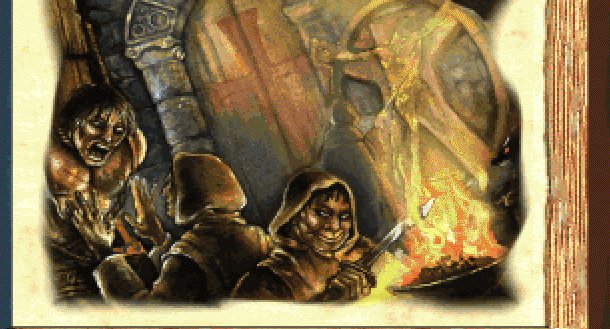
Why are these chivalrous bankers so embedded in pop culture? There are many apocryphal stories tied to these events, like du Molay cursing both the King and the Pope and having them die within a year (not true, but never mind), but mostly it comes down to money. The Templars were phenomenally rich, which makes people assume they must have stashed away huge fortunes before folding. They've also been connected to many relics and supposed relics, letting them act as a kind of religious McGuffin warehouse. The Holy Grail is the most commonly used, as seen in another game, Azrael's Tear.
Mostly though, they're just convenient, and people have heard their name. They're well enough known to be useful, but with enough grey areas and convoluted bits of history to be worked into any story that needs a bit of conspiracy theory. The standard schtick is that they're still around, powerful, and usually evil—usually trying to enforce their rules or change the world through some weaponised religious artefact. Actual connections to the real order are few and far between, because du Molay probably didn't really pick his teeth with the Lance of Longinus or wipe off sweat with the Shroud of Turin.
In Time Gate? They're all dead by the start, so none of this matters one little bit.
Still, learning is fun, right?
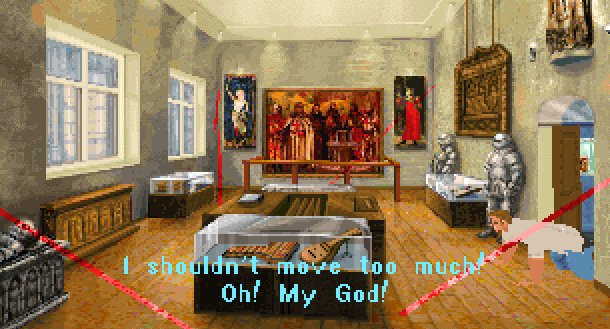
Time Gate was intended to be the successor to Infogrames' staggeringly popular Alone in the Dark series, which started off as a tense, Lovecraftian horror that would set the template for the later Resident Evil games, and then quickly became very silly indeed. In the second game the enemies are zombie pirates and at one point you sneak past a load of them by dressing in a Santa suit. The third game moved the action to the wild west, with undead cowboys, Indian magic, and the main character occasionally transforming into a cougar. Then came The New Nightmare, most notable for adding the elements that Uwe Boll would use for one of his terrible, terrible movies, and then the failure to revive the series, Alone In The Dark: No, Not That One, A Crappy New One With No Ending.
The real Alone In The Dark was a must-play at the time. Unfortunately for Time Gate, what made it memorable was its dark atmosphere, the technical innovation of putting 3D polygon characters on gorgeously detailed backgrounds, and genuinely frightening moments. The opening scene was in the attic of a haunted house, unarmed, a couple of minutes before a monster attacks. You had to rush around blocking any entrances before it burst in and gutted you.
This is the kind of opening that demands attention!
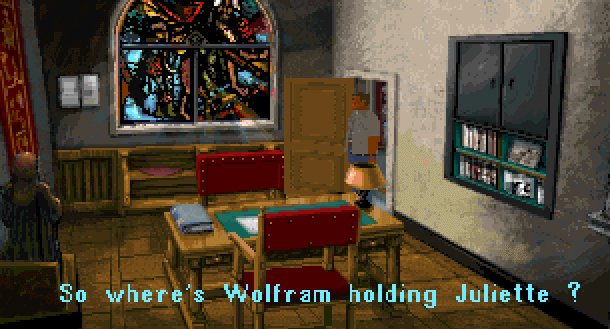
Time Gate didn't have anything like the same hook. It was appallingly marketed, right down to being given the nonsensical subtitle "Knight's Chase". The demo then revealed a spectacularly poor start, mostly wandering around a museum being bored, and realising both the engine and stodgy combat had long since lost its charm and now creaked with the force of a sonic boom. Even if you don't mind the constant pixel hunting for items or pixel-perfect movement required to dodge laser grids, a main character who's heard of charisma but decided he doesn't want any of it, or the fact that the villain has no reason whatsoever to not just walk up and punch you... actually, I have no idea. You should be bothered by that. It sucks. If it sounds like your idea of fun, seek help.
Hypothetically speaking though, should you have standards so low that worms use them for limbo practice, the scraps of writing you actually get are beyond terrible. Picture the scene: William, beaten unconscious by mysterious guards and hurled down a well, only to find himself cold and alone in the distant past. He barely gets a second to shiver in the snow before guards are on him—spears thrust in his face. From behind, a red-headed monster who has already broken the laws of time itself to strike him in his bedroom strides up and declares himself an Inquisitor—condemning William to a rotting cell to await an agonising death by fire and possible eternity in hell depending on personal religious belief.
And his first response to all this?
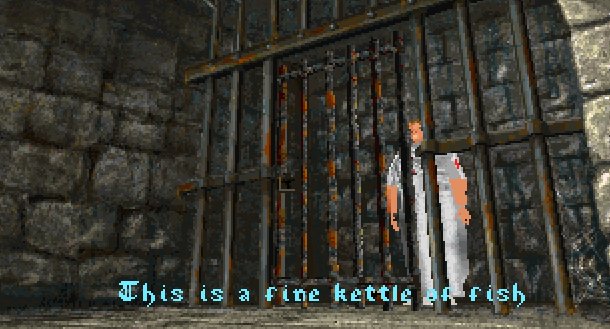
Time Gate's biggest problem though, is its plot. It barely has one. The majority of the game is spent simply stumbling around a castle and trying not to be killed by guards, random deathtraps, or your brain dribbling out of your ears at the inane puzzles it forces you to—for want of a better word—solve.
Many are simply 'push the thing' in design, but every now and again something stranger will happen, like William coming across an old Templar knight who starts beating him to death, but refusing to so much as lift a finger to defend himself on the grounds that "He's not right in his mind!" Or later on, facing an executioner coming at you with a giant axe—an enemy defeated not by picking up a mace on the floor and smacking his head until his brain turns into a delicious snack for toothless vultures...
...wait for it...
...but by blowing a horn that just happens to be sitting on a table to...
...I swear I am not making this up...
...transform yourself into a gold-armoured falcon beast with THE POWER OF AN EGYPTIAN GOD!
(You then reach the next stage of the game by flying up the side of the castle, Super Saiyan style. And then, for no particularly good reason, actively give up those powers before going to face your nemesis in his Satan pit. I suppose William decided anything else just wouldn't be fair. Idiot.)
To compensate for the lack of plot throughout the game, Time Gate puts all of it into just two scenes, both right at the start of the game. The first is okay—it's the intro, which starts off in the past with a Wolfram victory that ends up dragging William into the chaos. As for the second... well... skip to 23:00 to see the whole metaplot spoiled before it even starts. Game writers? See this? Don't do this!
The number of actual plot points beyond that can be counted on the fingers of one hand making the 'up yours' sign at this game. What is the secret of the Templars? Well, shockingly for an organisation that was into banking, it's that they have a treasure room with a few chests of gold and jewels in it. It's the kind of haul that would make a person fabulously wealthy, yes, though not exactly National Treasure level loot. What's Wolfram up to? Evil, mostly. He spends most of the game just cackling in a high-pitched voice like a cross between The Joker and Judge Doom. William defeats him not in an epic sword-fight, but by wandering past with little more than a "Yo, 'sup?" and dropping a stone cross on him.
(He does get in a line afterwards, but unfortunately it's "FAREWELL, WOLFRAM! MONK OF THE UNDERWORLD!" I won't say it's the worst one-liner a hero has ever said to his nemesis, but that's only because Little Big Adventure 2 featured the immortal "You suck big time and I'm going to take you out and I don't mean for pizza!" That will never be beaten. Ever. It's just not possible.)
What else is there to say about this one? Not a lot. It was quickly forgotten, and the rest of the games cancelled immediately. It's an amusing glimpse into another world though—one where Assassin's Creed didn't try to make its name with parkour and epic cities, but with adventuring and puzzles. Infogrames wasn't up to the challenge of making it work, but maybe... in the hands of better developers...

On second thoughts, maybe not.
Want to see the whole Time Gate experience for yourself? Check out this Let's Play over on Viddler. (Incidentally, you know a game was forgotten when even YouTubers can't be bothered to run through it again.) Alternatively, take a look at this epically short Making Of to see what they thought they were working on. Either way, be glad for William Tibbs, the rare hero last seen in a cliffhanger ending who still gets to walk away with his life, the girl, and the satisfaction of a job well done.
But if the world ever blows up for want of ancient magic weapons, we know who to blame.

Post a Comment